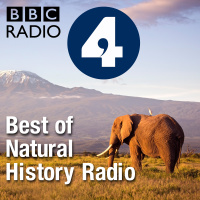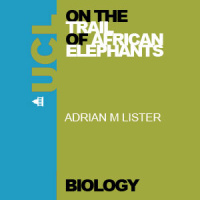Best Of Natural History Radio
- Autor: Vários
- Narrador: Vários
- Editor: Podcast
- Duración: 147:19:52
- Mas informaciones
Informações:
Sinopsis
The BBC Natural History Unit produces a wide range of programmes that aim to immerse a listener in the wonder, surprise and importance that nature has to offer.
Episodios
-
A Life With... Corals
28/03/2012 Duración: 14minEpisode 3 of 5: Corals Corals? In Devon? Believe it or not there are lots of corals around the British coastline. Mary Colwell meets Keith Hiscock: a man who has spent his life learning about Coral around the UK; inspired by re-tracing the steps of Victorian naturalist, Philip Henry Gosse.
-
A Life With... Water Voles
27/03/2012 Duración: 14minEpisode 2 of 5: Water Voles Water voles are famous for being Ratty in Wind in the Willows, but they are disappearing fast from our waterways. Mary Colwell meets a water vole warrior who is determined to save them. Darren Tansley fell in love with water voles as a boy, messing around on a raft his dad made from an old barn door. 40 years later he is still messing about on the river, but now he is creating new, protected homes for water voles and makes sure their sworn enemies, the mink, don't get anywhere near them. Darren has a fascinating past. Not only has he always been monitoring and studying water voles he was a long haired eco warrior who played in a rock band and campaigned for Greenpeace. When he realised the conservation world didn't really listen to amateurs he went back to college to get the "proper" qualifications. Now his projects are paying off and Darren takes Mary to see water voles that have just returned to a water-way in Essex.
-
A Life With... Insects
26/03/2012 Duración: 13minEpisode 1 of 5: Insects Insects are not everyone's favourite part of the natural world, but a doctor in Norfolk just loves them. Dr Phil Wilkins' day job is a palliative care consultant but his overwhelming passion is insects. Mary Colwell goes to his home to see his garden designed for insects and to try to understand what the connection is between being a doctor and an entomologist. Phil's garden is insect heaven, everything in it is there for a reason, to attract insects and give them what they need to breed, but the surrounding land is intensively farmed fields of crops with barely any insect life at all. Dr Wilkins wants to heal the land, and bring back a healthy, vibrant natural community. This is one man's battle to save Britain's creepy crawlies for future generations.
-
The Living World 26 Feb 12 Winter Flies
26/02/2012 Duración: 22minFor Living World, Miranda Krestovnikoff asks "where do flies go to in winter" and discovers that many of them are around even in freezing conditions. Producer: Brett Westwood; Editor: Julian Hector.
-
The Living World 19 Feb 12 Woodcock
19/02/2012 Duración: 22minMiranda Krestovnikoff pays a nocturnal visit to the Hampshire countryside for a close encounter with one of our most mysterious birds, the woodcock.
-
The Living World 12 Feb 12 Ponds in Winter
12/02/2012 Duración: 21minMiranda Krestovnikoff discovers the life beneath the surface of some very special New Forest ponds in winter and finds rare snails , newts frogspawn and fairy shrimps. Producer: Brett Westwood Editor: Julian Hector
-
The Living World 5 Feb 12 Dippers
05/02/2012 Duración: 22minMiranda Krestovnikoff visits the Brecon Beacons where she explores the watery world of the dipper, a bird shaped by the rivers on which it depends. Producer: Brett Westwood
-
The Living World 29 Jan 12 Jackdaw Roost
29/01/2012 Duración: 22minFor this week's Living World, Joanna Pinnock heads to a site in Cambridgeshire which is currently part of a long term study into jackdaw behaviour. Here she meets Dr Alex Thornton on a blustery morning before dawn. As first light begins to creep silently over the horizon the first chattering's of a jackdaw roost can be heard. With increasing light, this chatter becomes louder until at some given signal, the jackdaws simultaneously leave their night roost in a cacophony of sound. It is a winter spectacle often overlooked but rivalling any in the natural world. So what is actually going on here? Producer: Andrew Dawes.
-
Yeti's Finger
18/01/2012 Duración: 27minHigh up a remote Himalayan Mountain in Nepal is a Buddhist monastery. The monks say there is no doubt yeti's roam the high forest, they see and hear them and they sometimes even attack people. The tantalising prospect of being the first to prove that this mythical ape like creature actually exists has been the goal of many explorers - but the beast has always evaded capture. Then the discovery of a supposed yeti's hand kept in the monastery set off a remarkable chain of events that drew in a mountain explorer, an American oil tycoon, a Hollywood film star and a high tech lab for forensic science in Scotland. But is it a yeti? Presenter: Matthew Hill Producer: Mary Colwell Editor: Julian Hector
-
Saving Species Sustaining Life
23/12/2011 Duración: 46minIn a special edition of Saving Species, recorded in front of an audience at the University of Bristol, Brett Westwood chairs a discussion about the building tension between the natural world and the burgeoning human population. Every 2 seconds another child is born. The human population is now over 7 billion and is projected to rise to 9 billion by 2050. All these people will need food, water, energy and materials, is that possible? How can a burgeoning population really live with a flourishing natural world? Sustaining Life takes the issue of the human population and nature head on. Presenter: Brett Westwood Producer: Mary Colwell Editor: Julian Hector
-
Saving Species (Srs 2) - 13 Dec 11 - Ep 30
13/12/2011 Duración: 28min30/30 For the final live programme of the series there will be an update from the BTO on the location of the five tagged cuckoos in the forests of Central Africa. Also on the move but on a much shorter journey are shags. Bob Swann reports from his well-monitored seabird cliffs at North Sutor in Scotland where he has been checking the ring numbers of the shags. Peter Burgess from the Devon Wildlife Trust takes Chris Sperring on an end of year update on the beavers who are being used to manage rare culm grassland. Mark Brazil reports on the conservation of the rare Lear's Macaw. Kelvin Boot joins Brett in the studio with the latest Wildlife news roundup Keep an ear out for the Saving Species special debate on "Sustaining Life" pre-recorded for broadcast on Friday 23rd December at 8pm. Presenter: Brett Westwood Producer: Sheena Duncan Editor: Julian Hector
-
Saving Species (Srs 2) - 06 Dec 11 - Ep 29
06/12/2011 Duración: 28min28/30 Michael Scott reports from the Flanders Moss peat bogs near Stirling. He discovers it's all about the management of water. Howard Stableford sends a second report about Pikas, where American biologists from Arizona State University explain that the Pikas are also critical for the retention of water on the plateau: their burrows, they claim, help prevent flood and drought. Jane Madgwick, Director of Wetlands International talks about water and the conservation of peat bogs at home and in the Himalayas. And what are fungi doing wearing tights? it's a parasitic fungus- the powder cap strangler - whose host is another fungus - Brett is in the field to find them. Presenter: Brett Westwood Producer: Sheena Duncan Editor: Julian Hector
-
Saving Species (Srs 2) 29 Nov 11 - Ep 28
29/11/2011 Duración: 28min28/30 In this weeks programme Buzzards are implicated as part of the cause in the decline of Brown Hares in North Wales. Hares are not commonly linked to a Buzzards diet - so can this be right. We're in North Wales to find out. We're also in Brazil with Mark Brazil who is exploring the flooded Amazon forest in search of the White Uakari Monkey. And back in the UK - news that many more of the global species of whales can be found in British waters. Presenter Kelvin Boot Producer Sheena Duncan Editor Julian Hector
-
The Living World - 27 Nov 11 - Cuckoo Trees
27/11/2011 Duración: 22minThe Living World: Cuckoo Trees In early winter, Joanna Pinnock heads up to the Stiperstone Hills in Shropshire. Here she meets up with Sara Bellis and Carl Pickup from the Shropshire Wildlife Trust at a remarkable place, The Hollies. Here high up on the windswept hills, Joanna encounters ancient holly trees, which could be as old as 400 years. Holly, naturally an understory tree of more developed woodland, is not suited to grow up here in the cold windy conditions. But how and why these trees came to be here is something of a mystery. Produced by Andrew Dawes
-
Saving Species (Srs 2) 22 Nov 11 - Ep 27
22/11/2011 Duración: 28min27/30 This week the programme is all about trees and forests. In the UK this is national tree week. We have a story where a 500 year plan is being rolled out to restore ancient woodland in the British landscape. We also have a report from Italy on the success of designating a forest "sacred" to save it. And the Monkey Puzzle tree. A report from Michael Scott on the importance of the genetic diversity of Monkey Puzzles in Scottish gardens and parks to the Chile, the native country of this species. Presented by Brett Westwood Produced by Mary Colwell Editor Julian Hector
-
The Living World 20 Nov 11 Winter Ladybirds
20/11/2011 Duración: 22minAs ladybirds become dormant in winter, their struggle to survive is examined. Joanna Pinnock joins Dr Helen Roy and Richard Comont in Oxfordshire. Produced by Andrew Dawes
-
Saving Species (Srs2) 08 Nov 11: Ep 25
17/11/2011 Duración: 28min25/30 Saving Species reports from Tampa Bay on studies following the movements and whereabouts of Sea Horses. How is it the males have been left "holding the baby" and why does understanding how the female has got out of rearing off spring help in the conservation of the species. We also get a report on efforts in Israel to stem the decline of marine turtles in the Mediterranean. The Sea Turtle Rescue Centre was set up in 1999 under the auspices of the Israel Nature and Park Authority with the aim to rescuing injured adult turtles and incubating eggs in replica nests. Presented by Brett Westwood Produced by Sheena Duncan Editor Julian Hector
-
Saving Species (Srs 2) 15 Nov 11 - Ep 26
15/11/2011 Duración: 28min26/30 Assisi in Italy is the town most strongly associated with Saint Francis - the patron saint of the environment. A fitting place for a unique gathering of world faiths and members of the global conservation community. They were there to inspire one another and find ways of working more closely together to protect the natural world. Karen Partridge joined the delegates and speakers in Assisi and will be in the studio to talk about the upsum of this special meeting of minds. And we're bring you an exclusive report and an encounter with a bird that is on the brink of extinction. A last ditch effort by two major UK wildlife organisations and collaborators in Russia might, in the long term, turn the fortunes of this most beautiful migrant bird. The Spoon-billed Sandpiper. Presented by brett Westwood Produced by Mary Colwell Editor Julian Hector
-
The Living World 13-Nov-11 Waxcap Grasslands
13/11/2011 Duración: 22minWest Wales receives a lot of rain, which is perfect for this week's Living World. Paul Evans joins Bruce Langridge from the National Botanic Garden of Wales and Dr Gareth Griffiths, a mycologist from Aberystwyth University on a fungal foray with a difference, as they look for waxcaps hidden amongst grass. Produced by Andrew Dawes
-
The Living World 06 Nov 11: Celtic Rain Forest
06/11/2011 Duración: 22minHigh in the hills of the Snowdonia National Park in Wales, can be found a rare and fascinating habitat. For this weeks' Living World, Paul Evans joins Ray Woods from Plantlife Cymru on a voyage of discovery into the Celtic Rainforest.





























